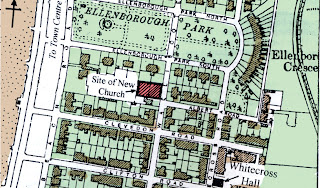Two weeks ago we filmed the second in a series of films about Home Mission in WEBA. We had a brilliant day in Weston-super-Mare - despite the floods of the previous week the sun shone and we got all the footage we needed at three different churches - telling the story of the town's Baptists who just keep moving on! I rode my bike from Wadham Street (now a theatre) to Clarence Park (planted in 1903) to Milton (planted in 1925) towards Worle Baptist Church, which was planted in 1983 with the help of a Home Mission grant, and from there to the Locking Parklands Development, a brand new community where two couples from Worle are in the process of moving in. The last part of the film, when it was beginning to get a bit dark and rainy outside, was filmed in one of the new houses, around a glorious lunch of chilli con carne and trifle.
We remarked on the fact that it's almost exactly 30 years since some folk from Milton Baptist Church took exactly the same step of faith by buying houses on the new estate at Worle, with a view to planting Christian community there. There were some similarities between church planting then and now, and also some differences.
Later, I interviewed Regional Minister Alisdair Longwill for our quarterly newsletter WEBA News. I asked him what's changed in the last thirty years:
AL: Today, we face a very
different cultural ‘landscape’. In 1983,
Boy George was singing Karma Chameleon, most people had never used a microwave
oven and almost a quarter of the UK population still watched black and white
TV. 10% attended church, compared to 6% in 2010, and the average age of those
attending increased from 39 to 51 during that time. Many changes have taken
place in UK society in the last 30 years, in terms of technology, in the
workplace, in peoples’ attitudes to lots of things including religion and
spirituality - even shopping and how we buy things has changed.
RW: So what’s that got to do with
church planting?
AL: When Worle BC was planted it
seemed natural to start by paying a pastor to begin Sunday Services and thereby
plant a church.
30 years later when a smaller
proportion of the UK are regularly attending church it seems natural to
consider how we might better connect and engage with those who are not-yet
Christians so that we can form relationships with them. It’s in relationship with others that we
share in the ‘journey’ of life; and so it seems right to seek to understand our
‘neighbours’ and ‘where they’re coming from’. As we live alongside one another
we might, in humility, from a position of greater understanding, better show
and share God’s grace and speak God’s truth.
RW: But – does that mean doing anything at all?
AL: One way (but not the only
way) of ‘planting a church’ today might be to get some ‘regular’ Christian
people who seek to intentionally live as missionary disciples to move into a
new housing development, and to look for modest funding to help equip them to
connect and engage with their neighbours in Jesus-shaped, kingdom-revealing
ways.
I’m sure that there are a variety
of different and appropriate models of planting churches in the UK today. But it seems likely that in most, if not all
UK contexts, relationships and time for them to be established are vital to the
process.
RW: Worle Baptist Church had a
grant from Home Mission to get it started. Is that something that’s changed,
too?
AL: In 1983, starting with
services and a full time pastor seemed the obvious first step, so Milton
Baptist Church was awarded a Home Mission grant to help with this when they
planted the church at Worle.
Whereas today the two couples
moving to Locking Parklands need training to respond to the new mission
context, so a Mission Project grant has been awarded, some of which will allow
them to complete the Crucible Course, which is designed for Christians “with
courage and imagination, who suspect that…we need to operate as cross-cultural
missionaries because we live in a cross-cultural mission context.” Home Mission
support needs to evolve to reflect changes in the way we engage in the mission
of God today.
Baptist Union structures, and the administration of Home Mission Grants,
are in the middle of some big changes. Do you think these will make any
difference to the support available to other WEBA churches who want to step out
in faith?
From 2013 Grants will be allocated by Regional Association Partnerships rather than by one central committee.
One hope for the future is that these changes might give rise to a
clearer sense of purpose (intentional and focused engagement in the mission of
God) and improved flexibility (a rise in the creative use of Mission Grants). This may take some time to ‘kick-in’ and in
the interim it might mean a reduced ‘budget’ to work with and the need to more
critically reflect on who meets the criteria for receiving a Mission Project
Grant (the more accurate term for a Home Mission Grant).
Thank you to all our churches who continue to give faithfully and generously to Home Mission, enabling steps of faith like this one around our region. Please remember that all giving for 2012 should reach us by Friday 14th December. The new film, A Moving Story from Worle, will be available in the new year.




No comments:
Post a Comment